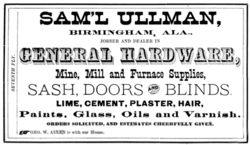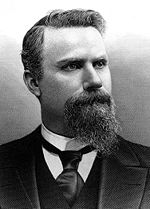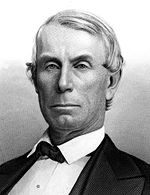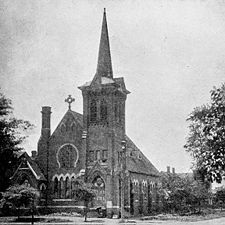1884
1884 was the 13th year after the founding of the City of Birmingham.
Events
- February 19: The 1884 tornado outbreak killed at least 44 people in Alabama.
- April 22: The 1884 Alabama State Exposition opened in the Alabama Mineral Exposition Building in Capitol Park.
- May 13–14: The 1884 Birmingham Musical Festival was held at O'Brien's Opera House.
- June: Grambs' Orchestra performed for 1st Methodist Church's Sunday School picnic in Blount Springs.
- Summer: Construction of a 25-foot wide roadbed for Highland Avenue was completed.
- August: Investigations into an "Underground river" below 5th Avenue North were undertaken.
- Calera Lodge No. 445 was charted.
- The Leeds post office was established.
- Misses Allen School girls' preparatory academy was founded.
- W. B. Sommerville began keeping records of weather observations from various downtown buildings.
- Sunnyside Academy in Powderly was established.
Business
- January: Frank Evans began pubilshing the Sunday Chronicle.
- March 15: Peter Zinszer founded his "Mammoth Furniture House"
- March 19: The Birmingham Mineral Railroad was chartered for business as an operating division of the Louisville & Nashville Railroad.
- April: The Florence Hotel opened for business.
- April: The Alabama State Bank was founded in Birmingham.
- April 3: The Eureka Land Company sold 442 acres of King's Spring to the officers of the newly-formed Avondale Land Company for $52,500.
- April 24: National Bank of Birmingham merged with City Bank to create the First National Bank of Birmingham.
- May 1: The Birmingham Iron Age changed its nameplate to The Weekly Iron Age.
- May: W. M. Reynolds opened the Capitol Hotel.
- May 22: Emil Lesser opened a restaurant above the Exchange Saloon.
- December: J. E. Webb and John Tillman formed the law partnership of Webb & Tillman.
- The Alabama State Bank was founded.
- William Aikin and Samuel Lighton opened the Iron City Foundry & Machine Works on 16th Street North.
- The Birmingham Insurance Company was organized by T. L. Hudgins.
- The Birmingham Street Railway Company was established.
- Bookkeeping firm P. H. Earle & Co. became Earle & Terrell.
- The Elyton Land Company celebrated the payment of its first issue of bonds.
- The Georgia-Pacific Railroad began offering service from Woodlawn into the rapidly-growing city of Birmingham, about 4 miles to the west.
- Law firm Hewitt & Walker became Hewitt, Walker & Porter.
- Slaton, McGlathery & Burwell warehouser opened.
- Samuel Ullman opened the Ullman Hardware Company at 1808–1810 2nd Avenue North.
- Madam Louise Wooster established a brothel at 1914-16 4th Avenue North.
Government
- August 4: The 1884 general election was held.
- Samuel Greene was elected to the Alabama House of Representatives.
- Chambers McAdory was re-elected to the state legislature.
- Moses Barton succeeded Elijah O'Rear as Walker County Sheriff.
- Andrew Tarrant was re-elected as tax assessor for Jefferson County.
- Edwin F. Vest succeeded Francis A. Nelson as Shelby County Sheriff.
- November 4: The 1884 presidential election was held.
- Birmingham City School's Board of School Trustees was reorganized as the Birmingham Board of Education.
- James Gilmer was appointed Adjutant General of Alabama and chief of Governor Edward O'Neal's staff.
- A. O. Lane was re-elected as Mayor of Birmingham.
- James Stiles was elected justice of the peace.
- Mitchell Porter was appointed to fill an unexpired term at Probate Court.
Religion
- July 11: Third Presbyterian Church was organized.
- September: Sardis Missionary Baptist Church was founded.
- 16th Street Baptist Church completed their first church building on their current site.
- W. O. Bailey succeeded I. H. Hendon as pastor of First Baptist Church of Birmingham.
- James E. Chambliss became pastor of Ruhama Baptist Church and was then succeeded by William C. Cleveland.
- Jacob Fies succeeded Henry Lazarus as president of Temple Emanu-El.
- St James United Methodist Church was founded in Warrior.
- The Temple Emanu-El congregation purchased a plot at 5th Avenue North and 17th Street from the Elyton Land Company on which to build a worship hall.
- Pastor Thomas Walker was ordained by William Pettiford.
Individuals
- Farmer Andrew Beard sold the rights to his first patent, for a plow, for $4,000.
- John Carmichael began to read law and took on editorial duties for the weekly Alabama Free Press.
- Planter John DuBose moved to Birmingham.
- Physician Thomas Duke Parke earned his board certification in Dallas, Texas.
- John Phelan returned to Alabama to manage Birmingham's Cotton and Produce Exchange.
- N. F. Thompson moved to Birmingham.
- Future Yeilding's founders Frank and William Yeilding moved to Birmingham with their parents and siblings.
Births
- January 8: Malachi Wilkerson, choir director at Parker High School and 16th Street Baptist Church
- February 2: Lee Bidgood, founding dean of Culverhouse College of Commerce and Business Administration
- May 9: Pauline Fletcher, nurse and founder of Camp Fletcher
- October 5: Benjamin Roden Jr, businessman
- October 8: Chauncey Sparks, Governor of Alabama
- October 9: F. Page Seibert, Samford University benefactor
- October 30: Jake Salie, architect
- November 30: Eugene Knight, architect
- December 28: Ralph Smallman, civil engineer and building contractor
Graduations
- William Elias B. Davis from Bellevue Hospital Medical College in New York
- Daniel Greene from Emory College in Oxford, Georgia with a bachelor of arts
- Robert Kerr from Union College of Law in Chicago, Illinois
Marriages
- April 2: Newspaper editor Franklin Glass to the former Mattie Byrd Purnell.
- August 19: Robert Mustin to Mamie C. Williams in Pickens County
- Saloon keeper Christian Rambow to Ella Houser.
Deaths
- September 2: William Mudd, judge and businessman
- November 19: Benjamin Worthington, plantation owner
Works
Buildings
- 16th Street Baptist Church (first building at current location)
- Florence Hotel
- Jefferson County Bank Building
- Robert Jemison, Sr residence (downtown)
- Leeds Railroad Depot
- Sunnyside Academy
- The Red Gap Branch of the Birmingham Mineral Railroad was completed between Hedona and Irondale.
- Oakland Cemetery was established on Warrior Road.
Context
In 1884, the first edition of the Oxford English Dictionary was published. The Colchester earthquake struck England. The cornerstone for the Statue of Liberty's pedestal was laid. The Sino–French War began. The International Meridian Conference in Washington, D.C. fixed the Greenwich Meridian as the world's Prime Meridian. Democrat Grover Cleveland defeated Republican James G. Blaine in the presidential election. The Washington Monument was completed.
Notable books published in 1884 included Flatland by Edwin Abbott Abbott, Ramona by Helen Hunt Jackson, The Death of Ivan Ilyich by Leo Tolstoy, and The Adventures of Huckleberry Finn by Mark Twain. Notable music released in 1884 included "Oh My Darling, Clementine" by Percy Montrose, "The Fountain in the Park" (a.k.a. "While Strolling Through the Park One Day") by Ed Haley, and comic opera Princess Ida by Gilbert & Sullivan.
Notable births in 1884 included singer Sophie Tucker, inventor Alfred Carlton Gilbert, filmmaker Robert J. Flaherty, novelist Hugh Walpole, President Harry S. Truman, and First Lady Eleanor Roosevelt. Notable deaths included geneticist Gregor Mendel, Stanford University namesake Leland Stanford, Jr, inventor Cyrus McCormick, detective Allan Pinkerton, and chess player Paul Morphy.
| 1880s |
| << 1880 1881 1882 1883 1884 1885 1886 1887 1888 1889 >> |
| Births - Deaths - Establishments - Events - Works |



